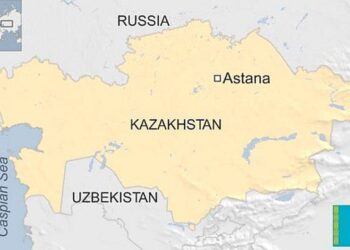In a meaningful diplomatic engagement, Assistant Foreign Minister Liu Bin of China and Kazakhstan’s Deputy Minister of Foreign Affairs Alibek Bakayev convened for crucial consultations aimed at strengthening bilateral relations between the two nations. This meeting, held as part of the 13th session of the security Cooperation Subcommittee, reflects the ongoing commitment of both countries to enhance collaboration on security and foreign policy issues. As regional dynamics evolve, the discussions are expected to address key areas of mutual interest and concern, highlighting the importance of partnership in ensuring stability and prosperity in Central Asia. This dialog not only underscores the growing ties between China and Kazakhstan but also signals a joint effort to navigate the complexities of contemporary geopolitical challenges.
Assistant Foreign Minister Liu Bin and Kazakhstan’s Diplomatic Engagement

In a significant step towards enhancing bilateral relations, Assistant Foreign Minister Liu Bin met with Kazakhstan’s Deputy Minister of Foreign Affairs Alibek Bakayev to hold high-level consultations between their respective foreign ministries. This meeting served as a platform for both sides to discuss crucial topics surrounding regional stability, security cooperation, and trade partnerships. The two officials emphasized the importance of sustaining dialogue and collaboration in various fields, which include:
- Trade and Investment: Exploring avenues to boost economic ties.
- Cultural Exchange: Fostering mutual understanding through cultural initiatives.
- Security Frameworks: Developing joint strategies to counter regional threats.
Additionally, the 13th Session of the Security Cooperation Subcommittee provided an opportunity to address pressing issues pertinent to both nations. The discussions delved into recent developments in security, focusing on how aligned strategies can effectively combat terrorism, cyber threats, and other transnational challenges. The session culminated in a shared commitment to strengthen mechanisms that support peace and stability in the region, underpinned by the following key agreements:
| Area of Cooperation | Action Steps |
|---|---|
| Counterterrorism Efforts | Joint training exercises and intelligence sharing |
| Crisis management | Regular consultations to enhance emergency response |
| Cybersecurity | Collaboration on protecting critical infrastructure |
Highlights from the 13th Session of the Security Cooperation Subcommittee

Recent discussions between Assistant Foreign Minister Liu bin and Kazakhstan’s Deputy Minister of Foreign Affairs Alibek Bakayev highlighted key initiatives aimed at enhancing regional security and cooperation. The two officials exchanged views on significant topics, including:
- Joint Security Initiatives: Emphasis on collaborative efforts to address emerging security threats in the region.
- Counterterrorism Strategies: Strengthening joint measures to combat terrorism and other forms of extremism.
- Border Security Enhancements: Focus on improving border management practices to ensure the safety of citizens.
- Protocol for Regular Consultations: Agreement to establish a framework for ongoing dialogue between the two Ministries.
The session also underscored the importance of regional stability and prosperity, with both parties agreeing to undertake further joint exercises and training programs. A notable proposal discussed was the establishment of a Security Cooperation working Group, which aims to foster closer ties and share best practices on security matters. the following table summarizes the agreed-upon actions:
| Action Item | Responsible Parties | Timeline |
|---|---|---|
| Launch joint Security Initiatives | Ministries of Foreign Affairs | Q1 2024 |
| Initiate Counterterrorism Workshops | Defense and Interior Ministries | Mid-2024 |
| Establish Working Group | All Relevant Agencies | Q3 2024 |
Key Topics Discussed: Strengthening bilateral Relations

The recent consultations between Assistant Foreign Minister Liu Bin and Kazakhstan’s Deputy Minister of Foreign Affairs Alibek Bakayev have underscored a fervent commitment to enhance cooperation across multiple avenues. During the dialogue,both officials emphasized the importance of cultivating a framework that nurtures mutual trust and respect. Some of the pivotal topics included:
- Trade and Economic Collaboration: Strategies to boost bilateral trade and pave the way for joint ventures.
- Cultural Exchange Programs: Initiatives aimed at promoting cultural understanding and people-to-people connectivity.
- Security Cooperation: measures to address regional security challenges and strengthen defense dialogue.
Furthermore, the discussions highlighted the intention to enhance existing partnerships through practical frameworks. Both parties are resolute to improve the effectiveness of cooperation in areas such as:
| Area of Cooperation | Proposed Initiatives |
| Energy Sector | Joint energy projects and resource sharing |
| Environmental Sustainability | Collaborative efforts aimed at addressing climate change issues |
| Education | Scholarship programs and academic partnerships |
Strategic Outcomes and future Prospects for China-Kazakhstan Cooperation

The recent consultations between Assistant Foreign Minister Liu Bin and Kazakhstan’s Deputy Minister of Foreign Affairs Alibek Bakayev highlight the growing strength of intergovernmental ties and the strategic partnership between China and Kazakhstan. During these discussions, both parties emphasized the importance of broadening cooperation across various sectors, notably in economic, security, and cultural realms. Key anticipated outcomes from this collaboration include:
- Enhanced economic integration: The two nations aim to deepen trade relations and stimulate investment opportunities that align with their long-term economic strategies.
- Security cooperation: Joint initiatives to combat regional threats, strengthen border security, and share intelligence will be prioritized to ensure a stable environment conducive to growth.
- Cultural exchange initiatives: Programs aimed at increasing people-to-people contact and mutual understanding are being planned, fostering goodwill and collaboration at multiple levels.
Looking ahead, the future prospects of this bilateral relationship are promising, particularly as both nations navigate a complex international landscape.The potential expansion into new areas, such as environmental cooperation and technological innovation, lays a foundation for enduring growth and mutual benefit. Notably, the formation of a structured governance framework for ongoing dialogue will allow both China and Kazakhstan to adapt swiftly to emerging challenges and opportunities.The alignment of their developmental goals is highly likely to set a precedent for cooperation in the broader region, embodying a model for mutual respect and shared prosperity.
Recommendations for Enhanced Security Collaboration

The recent consultations between Assistant Foreign Minister Liu Bin and Kazakhstan’s Deputy Minister of Foreign Affairs Alibek Bakayev marked a pivotal moment for security collaboration, highlighting the necessity for joint initiatives aimed at promoting safety and stability in the region. To strengthen this partnership further, the following strategies are recommended:
- Regular Joint Training Exercises: Establishing periodic military and law enforcement drills to enhance operational readiness and mutual understanding.
- Details Sharing Framework: Developing a secure dialogue system for the timely exchange of intelligence related to regional threats and challenges.
- crisis Management Workshops: Organizing collaborative training sessions focusing on crisis response strategies to manage potential security incidents effectively.
additionally,fostering academic collaborations can enrich the dialogue around security issues. Initiatives may include:
- Scholar Exchange Programs: Facilitating exchanges between universities and research institutions to promote understanding of each nation’s security landscape.
- Joint Research Projects: Establishing partnerships to explore emerging security threats and develop innovative solutions through combined expertise.
- Annual Security Conferences: Hosting an annual event where policymakers, academics, and security experts can come together to discuss and propose solutions for shared concerns.
Implications for Regional Stability and International Relations

The recent consultations between Assistant Foreign Minister Liu Bin and Kazakhstan’s Deputy Minister of Foreign Affairs Alibek Bakayev mark a significant step in fostering stability in the region. Such diplomatic engagements underscore the commitment of both parties to enhance bilateral relations, which is crucial given the evolving geopolitical landscape. The discussions focused on security cooperation, economic collaboration, and cultural exchanges, setting a framework that supports mutual interests. This developing partnership is not just crucial for China and Kazakhstan, but also serves as a benchmark for other Central Asian nations to follow, potentially leading to a more coordinated approach towards regional challenges.
Moreover, the outcomes of the 13th Session of the security Cooperation Subcommittee highlight the increased importance of multilateral dialogue in addressing shared security concerns. Key implications for international relations include the potential for increased joint military exercises,intelligence sharing,and enhanced border security protocols. These cooperative measures could serve as a deterrent against external threats and foster a sense of stability that attracts foreign investments.As both nations bolster their strategic ties, the ripple effects may also encourage neighboring countries to reassess their own diplomatic stances, potentially leading to a shift in alliances and a reconfiguration of power dynamics in the region.
In Conclusion
the recent consultations between Assistant Foreign Minister Liu Bin and Kazakhstan’s Deputy Minister of Foreign Affairs Alibek Bakayev mark a significant step in enhancing bilateral relations and fostering regional security collaboration. As the two nations explore avenues for deeper cooperation through the 13th Session of the Security Cooperation Subcommittee, initiatives emerging from these discussions are expected to address pressing security challenges and promote stability in the region. The commitment showcased by both ministries underscores the importance of dialogue and partnership in navigating the evolving geopolitical landscape. Moving forward,these consultations may lay the groundwork for more comprehensive cooperation,ultimately contributing to peace and growth in Central Asia.

















